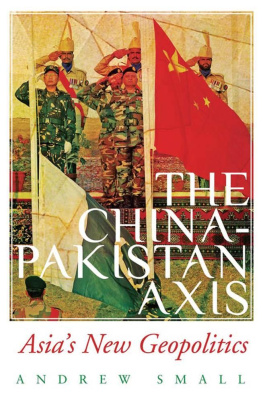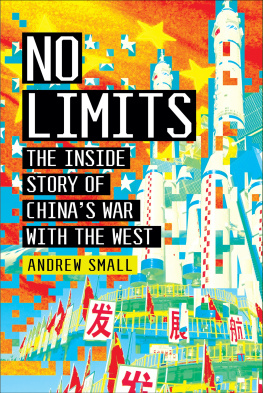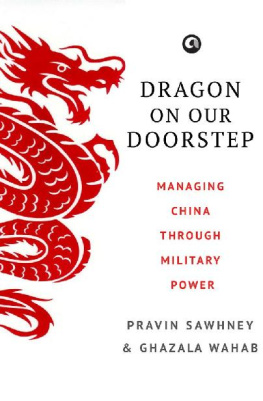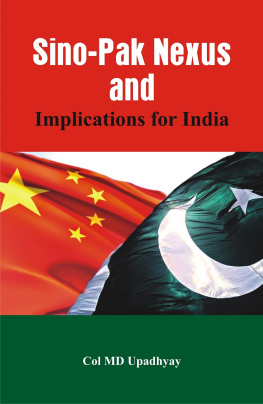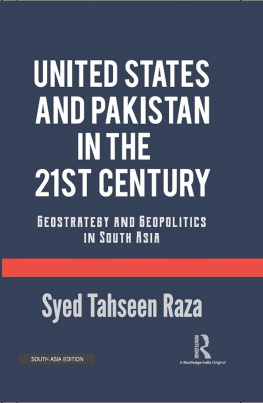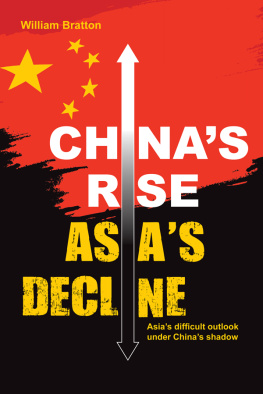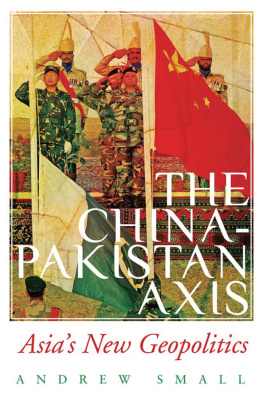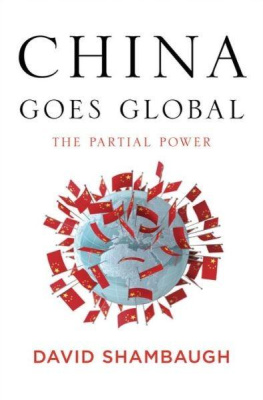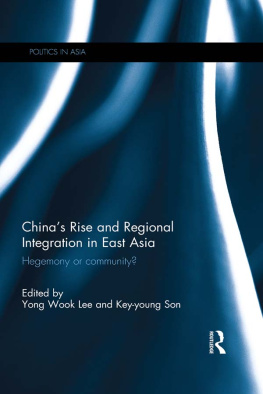Table of Contents
THE CHINA-PAKISTAN AXIS
ANDREW SMALL
The China-Pakistan Axis
Asias New Geopolitics


Oxford University Press is a department of the University of Oxford. It furthers the Universitys objective of excellence in research, scholarship, and education by publishing worldwide.
Oxford New York
AucklandCape TownDar es SalaamHong KongKarachi
Kuala LumpurMadridMelbourneMexico CityNairobi
New DelhiShanghaiTaipeiToronto
With offices in
ArgentinaAustriaBrazilChileCzech RepublicFranceGreece
GuatemalaHungaryItalyJapanPolandPortugalSingapore
South KoreaSwitzerlandThailandTurkeyUkraineVietnam
Oxford is a registered trade mark of Oxford University Press in the UK and certain other countries.
Published in the United States of America by
Oxford University Press
198 Madison Avenue, New York, NY 10016
Copyright Andrew Small, 2015
All rights reserved. No part of this publication may be reproduced, stored in a retrieval system, or transmitted, in any form or by any means, without the prior permission in writing of Oxford University Press, or as expressly permitted by law, by license, or under terms agreed with the appropriate reproduction rights organization. Inquiries concerning reproduction outside the scope of the above should be sent to the Rights Department, Oxford University Press, at the address above.
You must not circulate this work in any other form and you must impose this same condition on any acquirer.
Library of Congress Cataloging-in-Publication Data is available for this title Small, Andrew
The China-Pakistan Axis
Asias New Geopolitics
ISBN 978-0-19-021075-5
eISBN 978-0-19-025757-6
CONTENTS
| ANA | Afghan National Army |
| CENTO | Central Treaty Organization |
| CIA | Central Intelligence Agency |
| CICIR | Chinese Institute of Contemporary International Relations |
| CNPC | China National Petroleum Corporation |
| CPC | also CCP, Communist Party of China |
| ETIM | East Turkistan Islamic Movement |
| ETIP | East Turkistan Islamic Party |
| FATA | Federally Administered Tribal Areas |
| HIT | Heavy Industries Taxila |
| IAEA | International Atomic Energy Agency |
| IDCPC | International Department, Central Committee of the Communist Party of China |
| IED | improvised explosive device |
| ISI | Directorate for Inter-Services Intelligence |
| IMF | International Monetary Fund |
| IMU | Islamic Movement of Uzbekistan |
| JI | Jamaat-e-Islami |
| JuD | Jamaat-ud-Dawa |
| JUI | Jamiat Ulema-i-Islam |
| JUI-F | Jamiat Ulema-i-Islam (Fazlur Rehman group) |
| KGB | Committee for State Security |
| KKH | Karakoram Highway |
| LeT | Lashkar-e-Taiba |
| MCC | China Metallurgical Group Corporation |
| NATO | North Atlantic Treaty Organization |
| NEO | non-combatant evacuation operation |
| NSA | National Security Agency |
| NSC | National Security Council |
| NSG | Nuclear Suppliers Group |
| NPT | Non-Proliferation Treaty (Treaty on the Non-Proliferation of Nuclear Weapons) |
| OIC | Organization of the Islamic Conference |
| PLA | Peoples Liberation Army |
| PLAN | Peoples Liberation Army Navy |
| PML | Pakistan Muslim League |
| PML-Q | Pakistan Muslim League (Quaid e Azam Group) |
| PML-N | Pakistan Muslim League (Nawaz) |
| POW | prisoner of war |
| PPP | Pakistan Peoples Party |
| PRC | Peoples Republic of China |
| PSA | Port of Singapore Authority |
| PTI | Pakistan Tehreek-i-Insaf |
| S&ED | U.S.-China Strategic and Economic Dialogue |
| SCO | Shanghai Cooperation Organization |
| SEATO | Southeast Asia Treaty Organization |
| SIGINT | Signals Intelligence |
| SSG | Special Services Group |
| TIP | Turkistan Islamic Party |
| TTP | Tehrek-i-Taliban Pakistan |
| UAV | unmanned aerial vehicle |
| UF6 | uranium hexaflouride |
| WTO | World Trade Organization |
| ZTE | Zhongxing Telecommunication Equipment Organization |
The Pakistanis love China for what it can do for them, while the Chinese love Pakistanis despite what they do to themselves.
In the early hours of Sunday, June 24 2007, vigilante groups from Lal Masjid, the Red Mosque, raided a Chinese massage parlour and acupuncture clinic in sector F-8, one of Islamabads wealthiest neighbourhoods.
For the Lal Masjid radicals it was a serious tactical error. The same band of militants had been involved in a similar episode a few months earlier, when they rounded off their assault on another brothel by kidnapping four policemen. But the involvement of Chinese citizens made the June 24 incident far graver a matter. The treatment of Chinas overseas nationals had become a subject of acute sensitivity for Beijing. In the eyes of the more assertive sections of the Chinese public it was a test
The kidnappings set in motion a fateful chain of events that resulted, within weeks, in a bloody denouement at the mosque, and the irrevocable altering of the relationship between Pakistans military and its militants. And while the showdown between the army and the extremist bastion in the nations capital had been looming for some time, few would have anticipated the country that provided the final trigger for the confrontation. Not the United States, whose efforts to push Islamabad to crack down on domestic militancy were so often outmanoeuvred, but Pakistans all-weather friend whose requests could not be ignored: China.
For all the challenges that Pakistan faced, early in 2007 things seemed to be looking up. Annual growth ran at nearly 7 per cent. His efforts to position Pakistan as a crucial ally in the war against global terrorism continued to bear fruit, not least in the flow of billions of dollars of military aid and vital arms transfers.
China had its own part to play in this upbeat picture. The new port at Gwadarwhich Chinese companies had built and mostly paid forhad just been inaugurated, promising the next Dubai on the Makran Coupled with plans to expand the Karakoram Highway, which spans the high mountain passes in North-East Pakistan and North-West China, and a host of new telecommunications and mining investments, there was now hope that Pakistans prospects might be tied to Chinas extraordinary economic expansion. Beijing was even there to cushion the blow of the US-India civil nuclear agreement, announced in 2005. Not only was there a prospect of China giving Pakistan a matching dealthe expansion of the Chashma nuclear power plantsbut the US-India move seemed to mark the end of any temptation for Beijing to take a more balanced approach in its relations with its two South Asian neighbours. Residual Pakistani anxieties about China being lured away by Indias economic boom were instead superseded by the prospect of consolidating a new axis with the emerging superpower.

